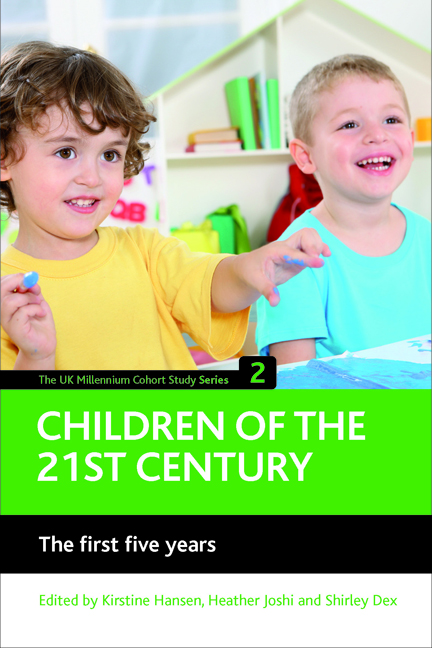Book contents
- Frontmatter
- Contents
- Acknowledgements
- List of contributors
- Glossary
- one Introduction
- two Child poverty in the first five years of life
- three Ethnicity, community and social capital
- four Parental relationships and parenting
- five Partnership trajectories, parent and child well-being
- six Employment trajectories and ethnic diversity
- seven Neighbourhoods and residential mobility
- eight Childcare in the pre-school years
- nine Intergenerational inequality in Early Years assessments
- ten Ethnic inequalities in child outcomes
- eleven School choice
- twelve Teacher assessments in the first year of school
- thirteen Childhood overweight and obesity
- fourteen Resilience in children's development
- fifteen Parental and child health
- sixteen Conclusions
- References
sixteen - Conclusions
Published online by Cambridge University Press: 01 September 2022
- Frontmatter
- Contents
- Acknowledgements
- List of contributors
- Glossary
- one Introduction
- two Child poverty in the first five years of life
- three Ethnicity, community and social capital
- four Parental relationships and parenting
- five Partnership trajectories, parent and child well-being
- six Employment trajectories and ethnic diversity
- seven Neighbourhoods and residential mobility
- eight Childcare in the pre-school years
- nine Intergenerational inequality in Early Years assessments
- ten Ethnic inequalities in child outcomes
- eleven School choice
- twelve Teacher assessments in the first year of school
- thirteen Childhood overweight and obesity
- fourteen Resilience in children's development
- fifteen Parental and child health
- sixteen Conclusions
- References
Summary
To round off this collection of contributions we pick out some themes that have emerged from the different aspects of the children's lives covered in the Millennium Cohort Study (MCS). We then draw together a few implications for the future.
The threads running through this volume and this study tell of diversity, mobility and intergenerational transmission. The diversity of the points from which the MCS children have started out on life include inequality in their family origins, while variation and inequality are beginning to emerge in the development paths of the children themselves. On mobility, the longitudinal data permits a view of the fluidity of the families’ situation over the first five years in almost as many dimensions: family composition, poverty, parental employment, location and childcare. The study also provides an important building block to assess secular change in intergenerational social mobility, and detailed evidence on the various routes through which parents transmit well-being and also social advantage to their children.
Diversity and equality
Taking a view over five years, it may be surprising that so many families of these young children have been touched by inadequate income at some time. On one measure of income poverty available from the MCS data, 39% of MCS families and their children have been affected. If subjective accounts of financial stress are included, nearly two thirds have not had enough financial resources on at least one of the three MCS surveys. The MCS shows that low income goes along with a number of other indicators: workless lone parenthood, workless couples, low parental education, low social class in terms of occupations, social housing, disadvantaged neighbourhoods or poor parental health. These are all different facets of socioeconomic disadvantage, which also tend to be associated with poorer outcomes for children, as measured at ages 3 and 5, on learning and behaviour ratings. This is illustrated by the figures in Chapter 9 (this volume) and replicated in many other chapters of this volume.
Ethnic diversity can be thought of as another dimension of inequality. It has become an important feature of life in the UK. The MCS was designed to allow for this, by over-sampling areas with high minority ethnic populations, which has indeed resulted in sufficiently large samples of the more sizeable minority ethnic groups to analyse separately.
- Type
- Chapter
- Information
- Children of the 21st century (Volume 2)The First Five Years, pp. 265 - 272Publisher: Bristol University PressPrint publication year: 2010



